Thomas James Richards, Diaries, Transcript Vol. 1, 26 August 1914 to 24 April 1915 - Part 17
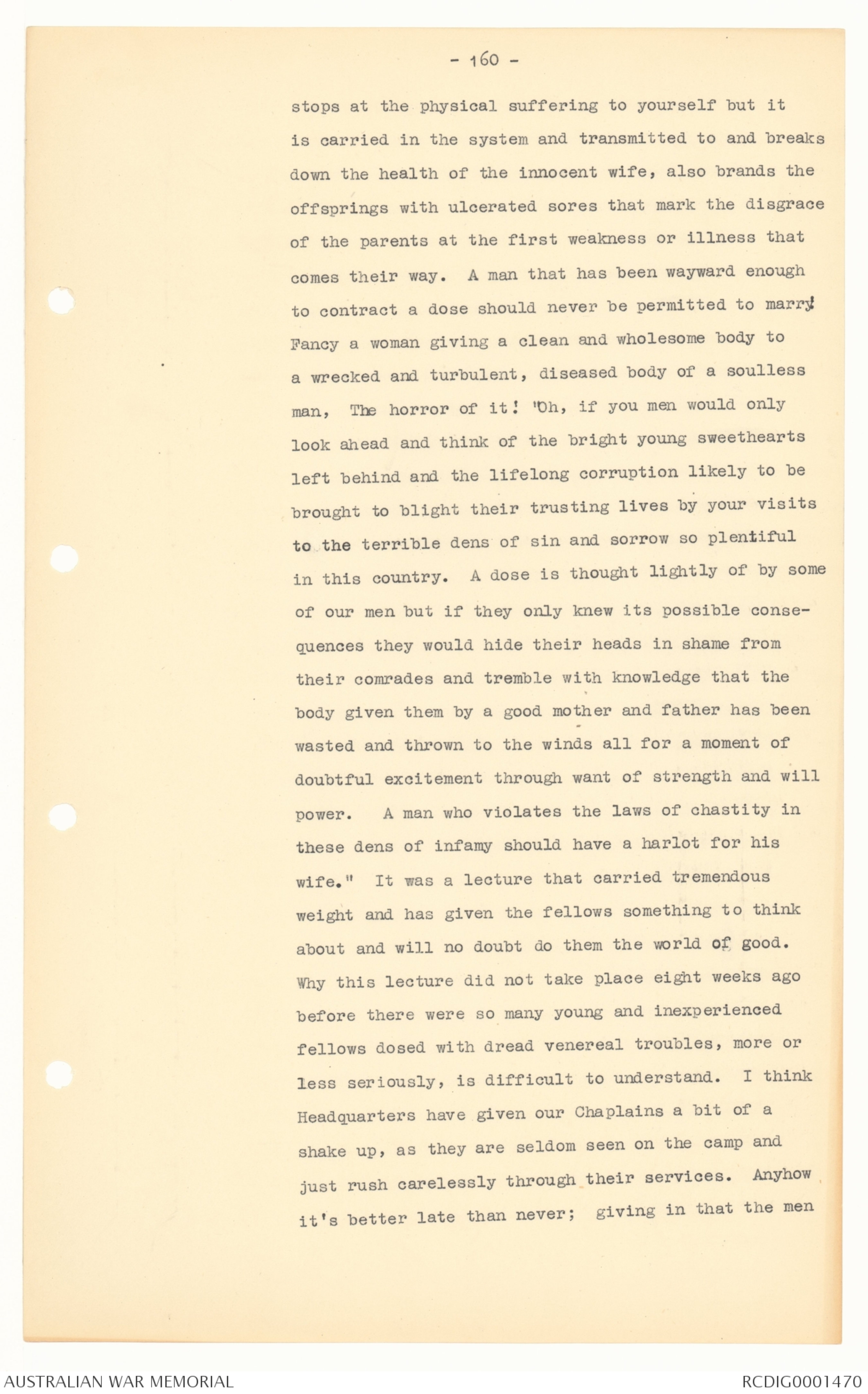
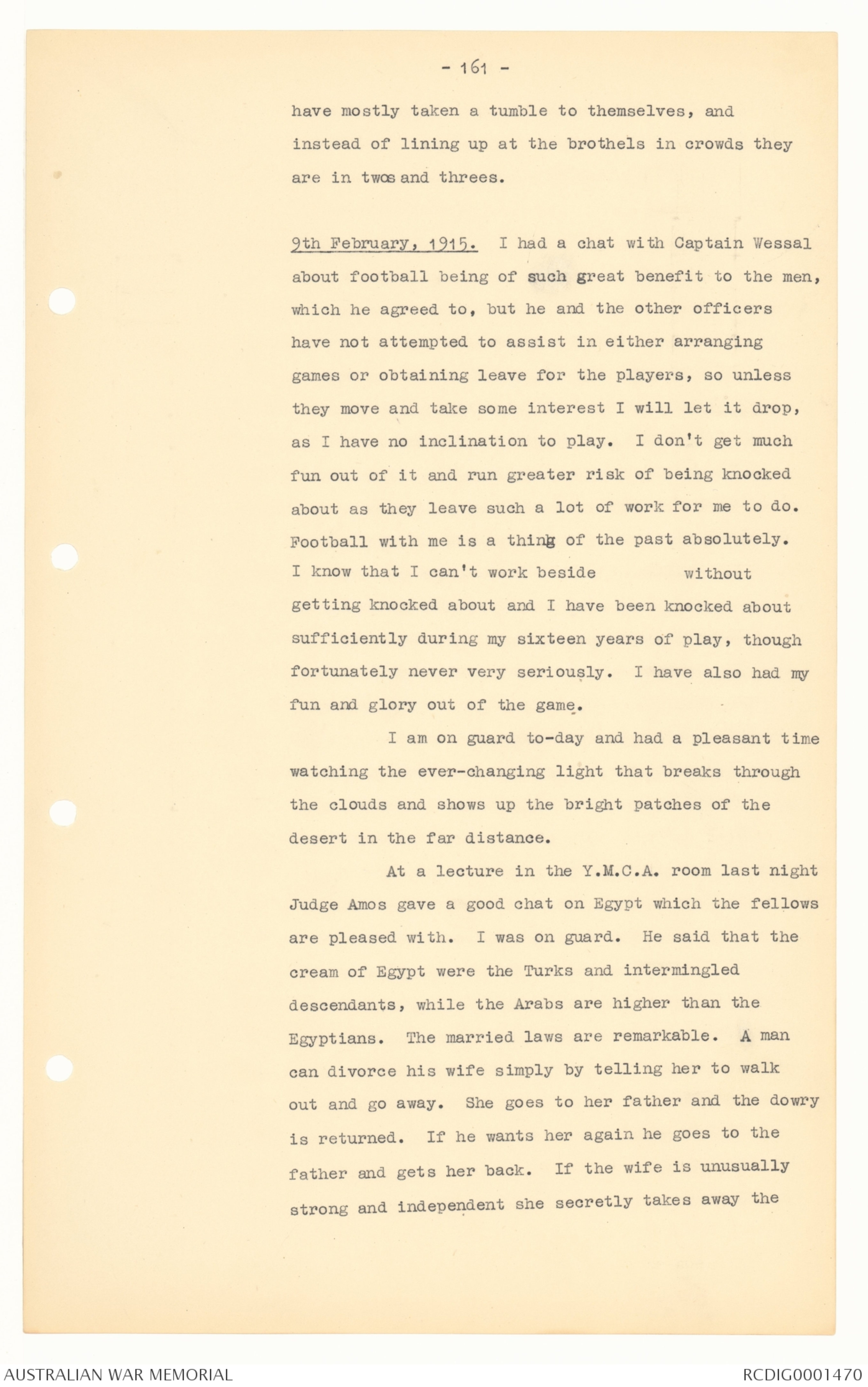
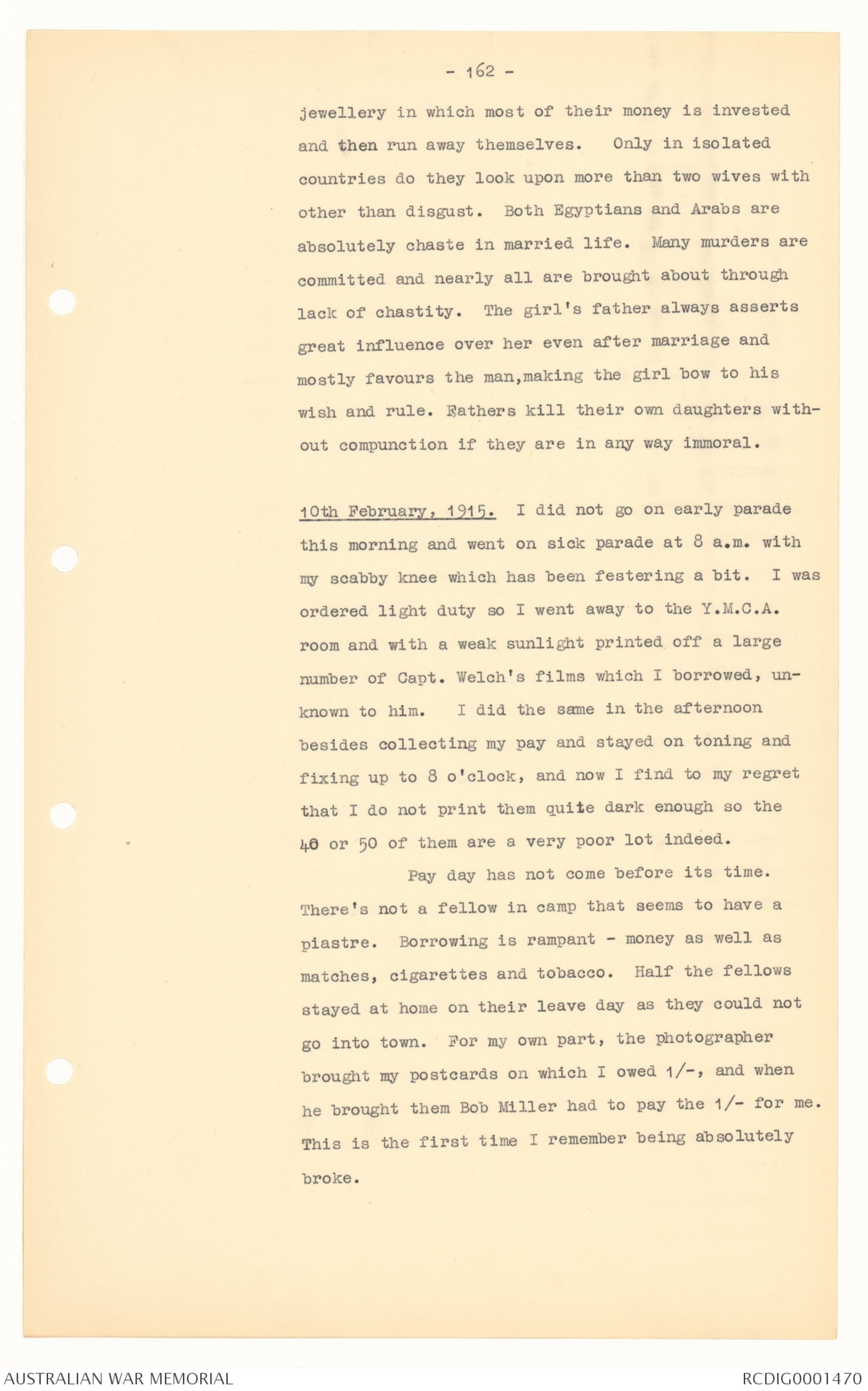
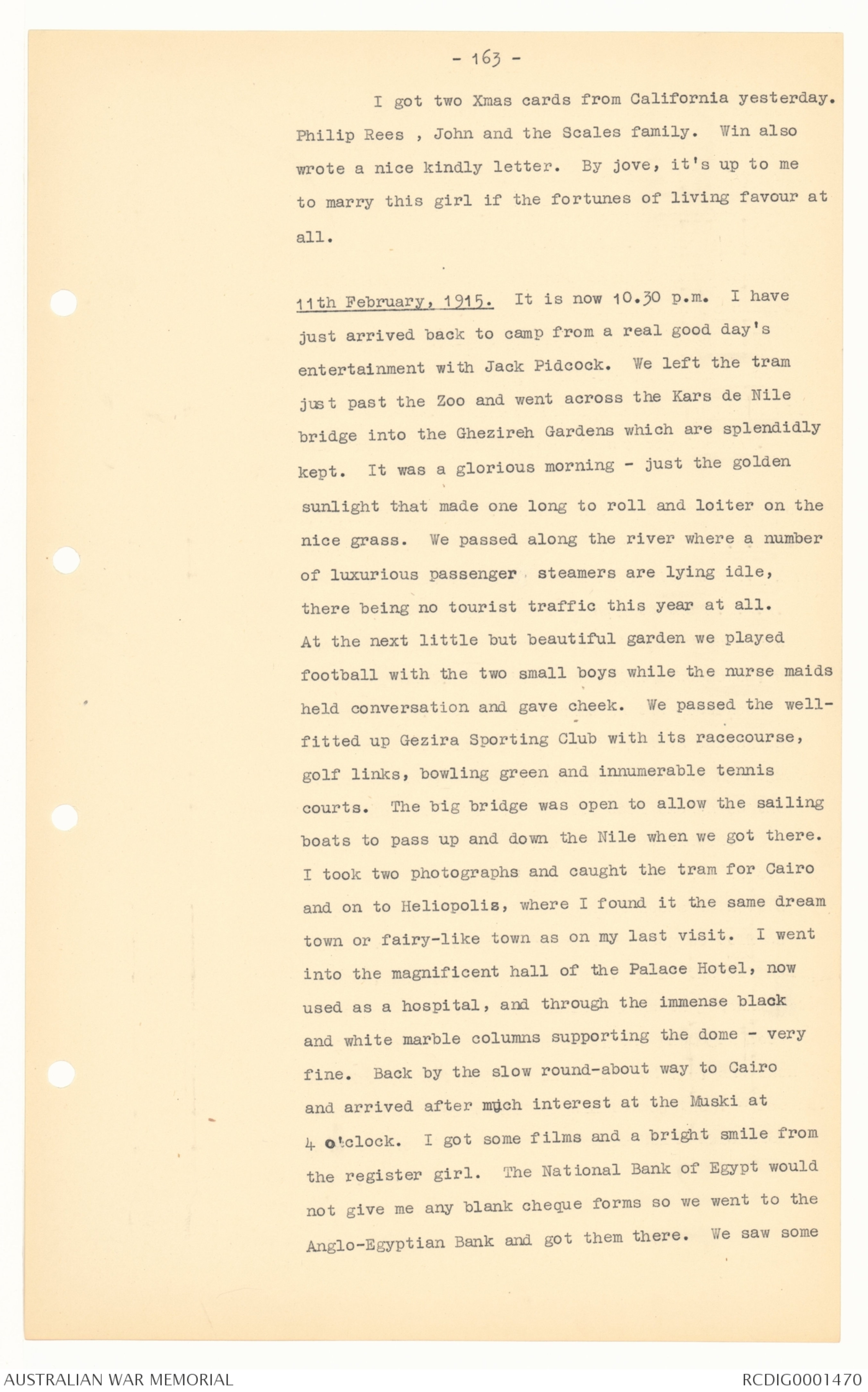
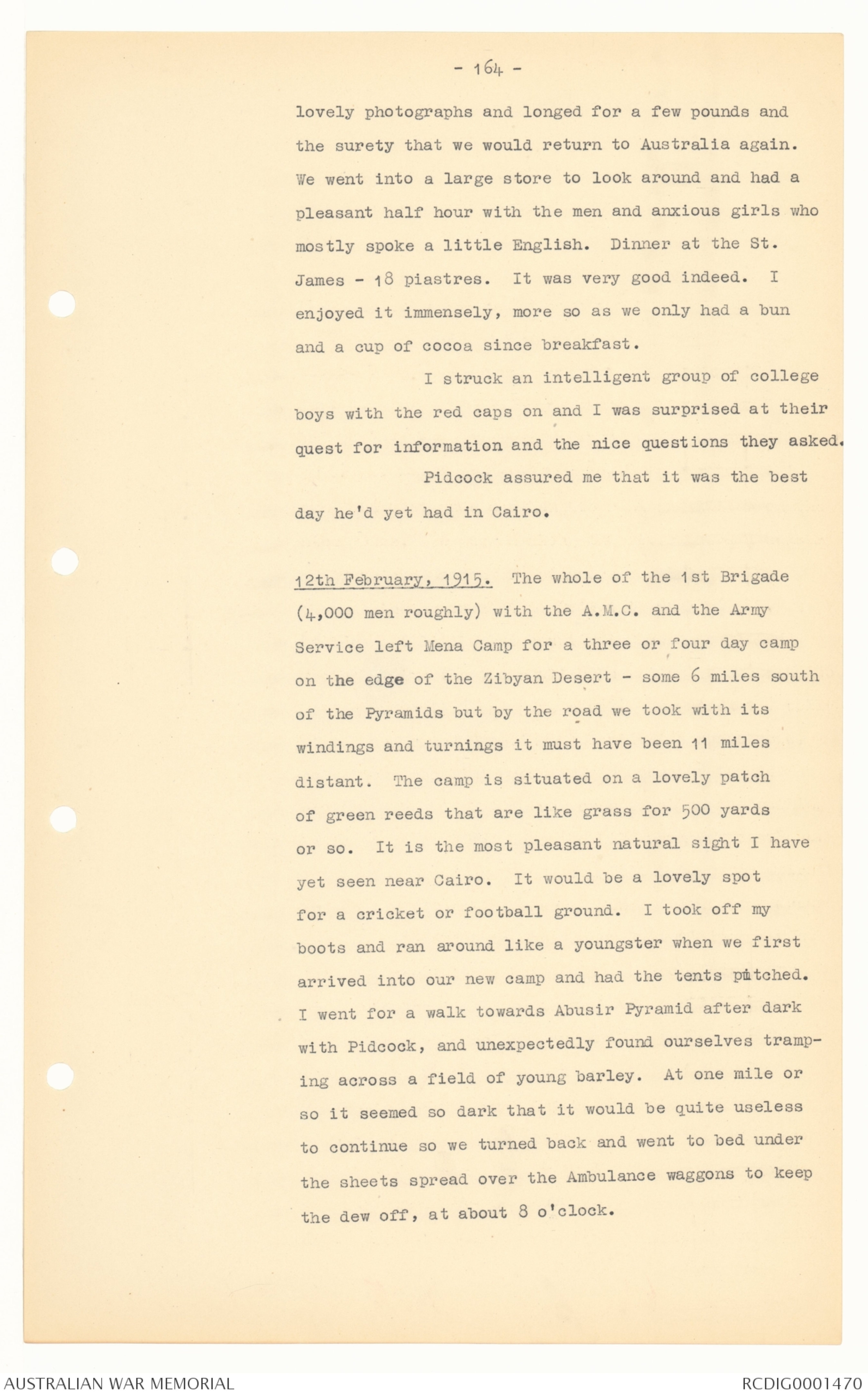
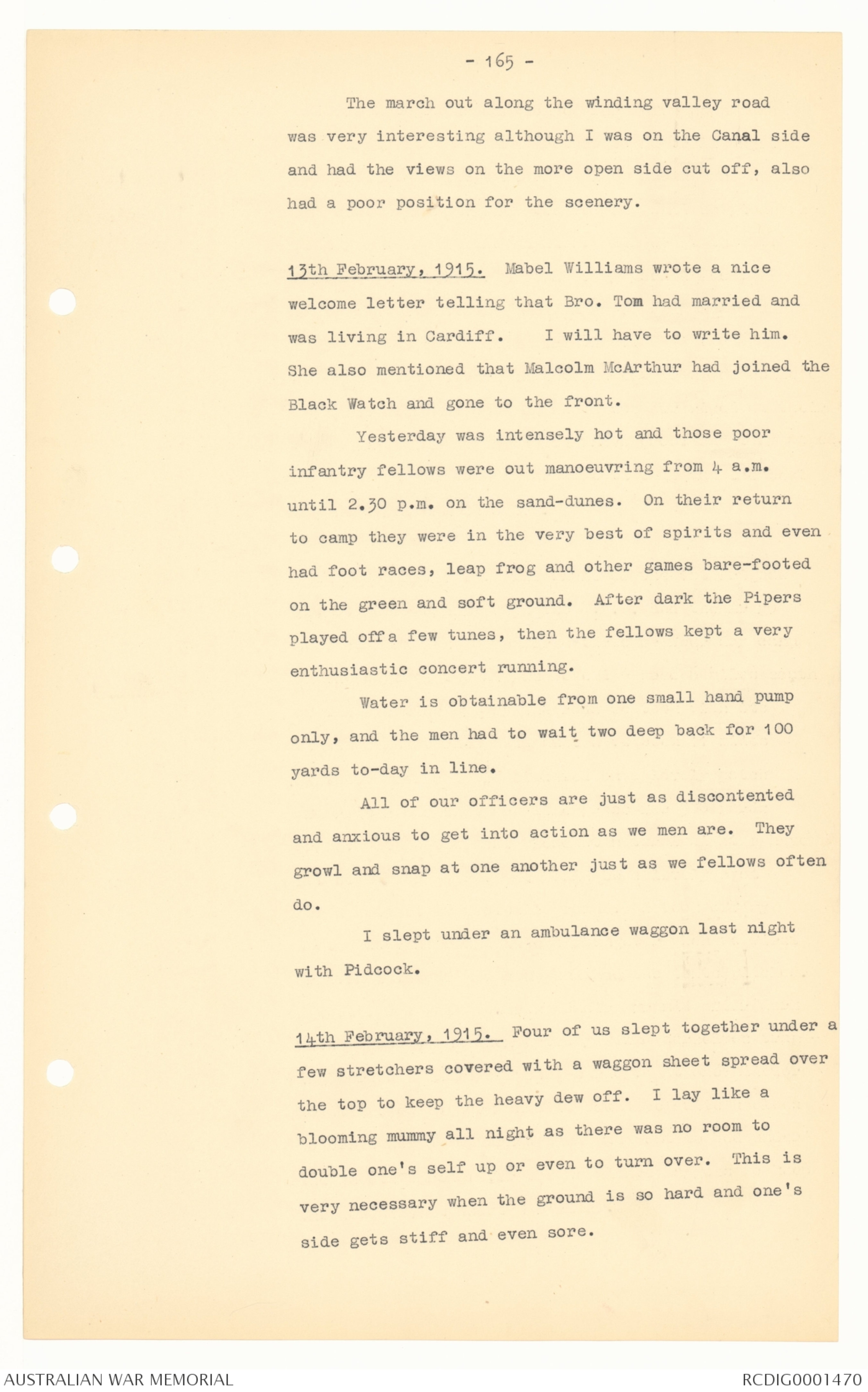
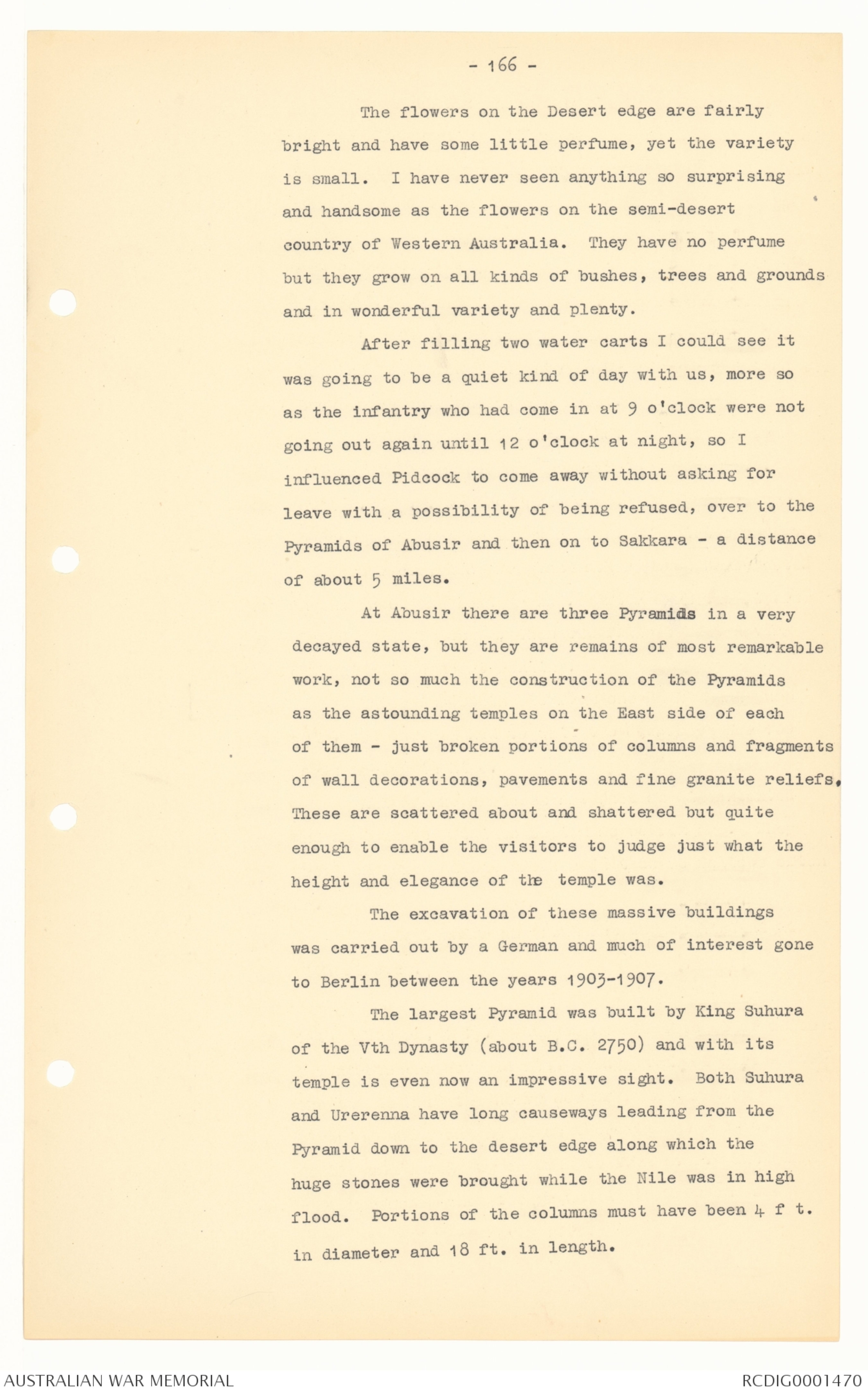
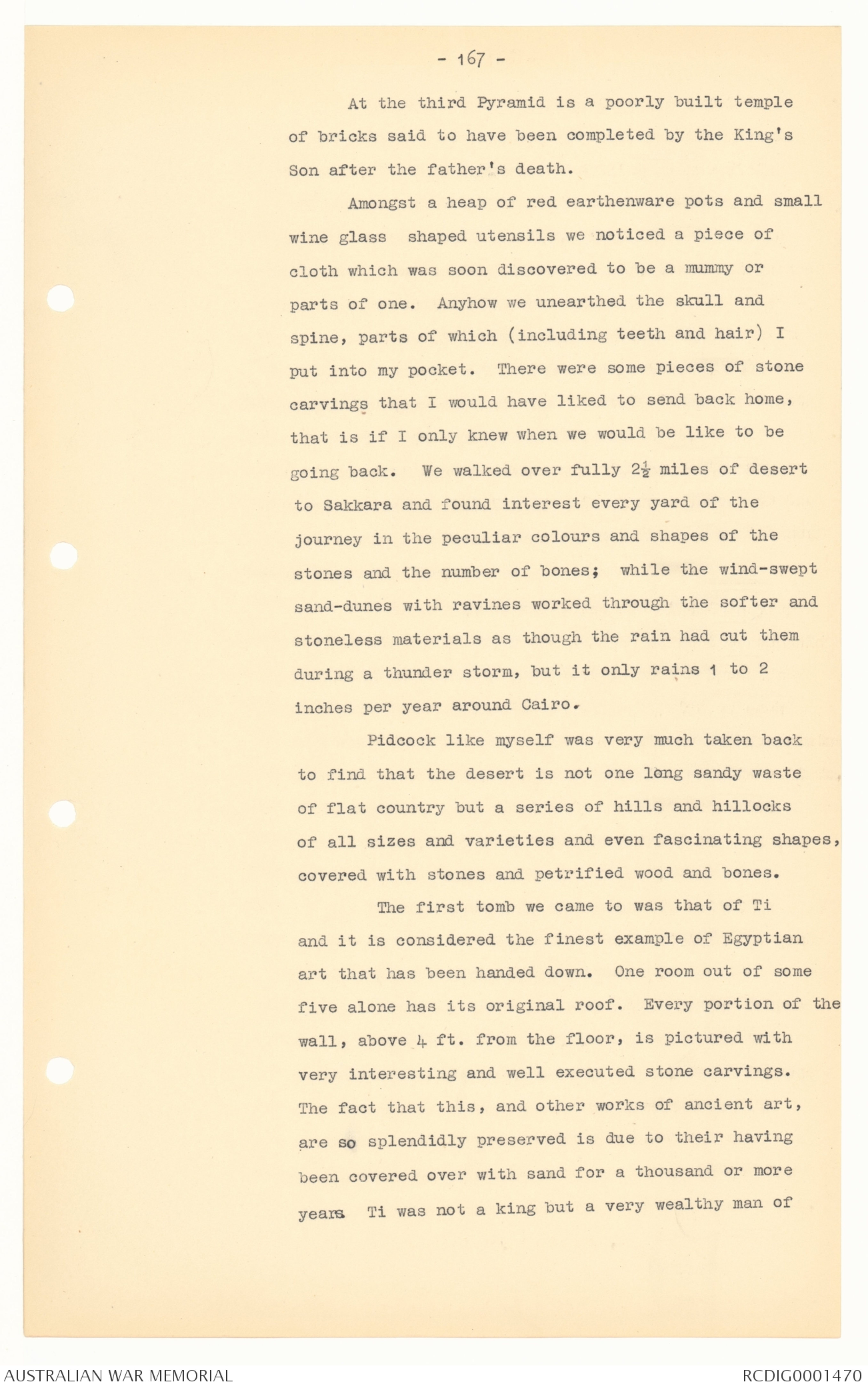
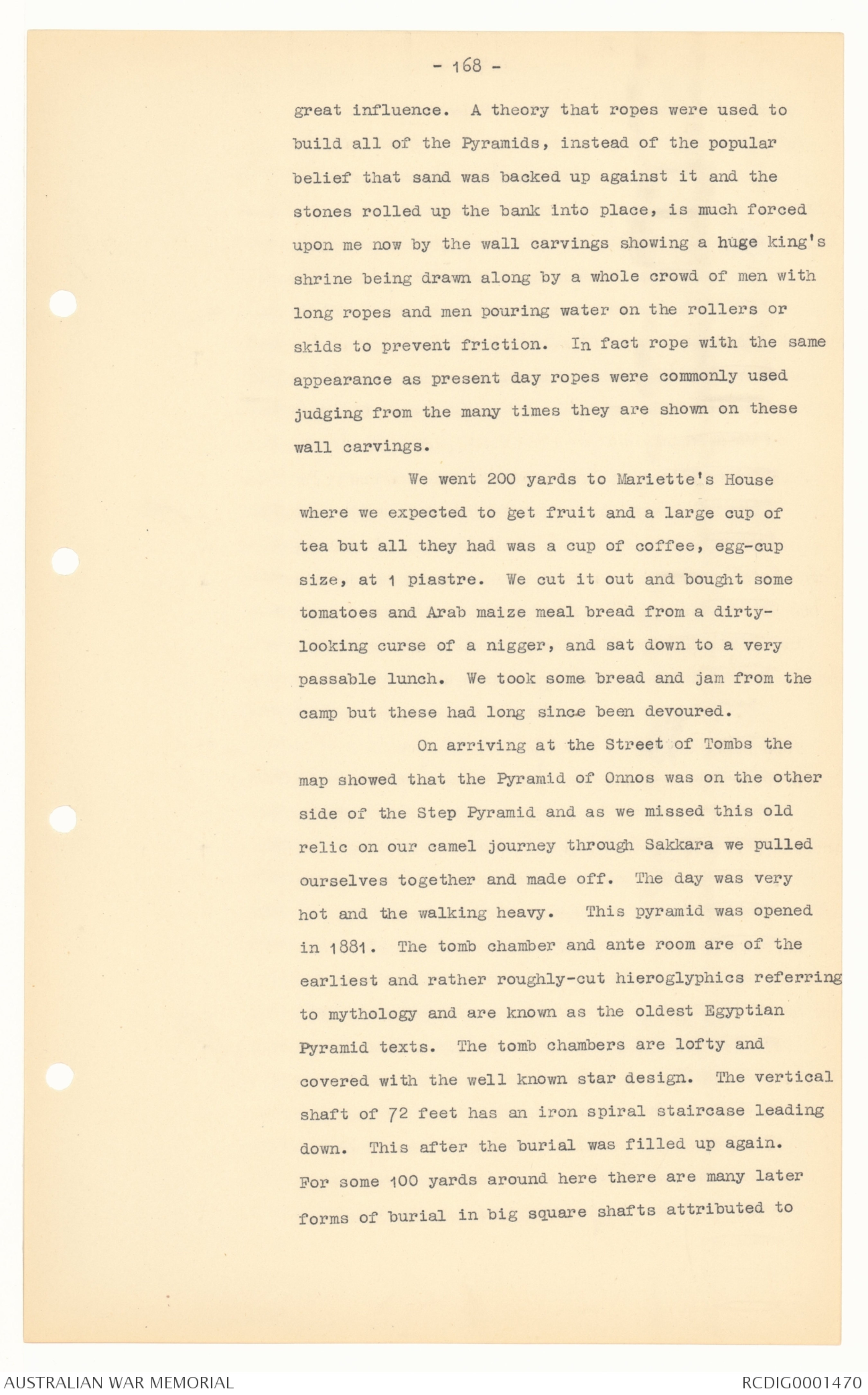
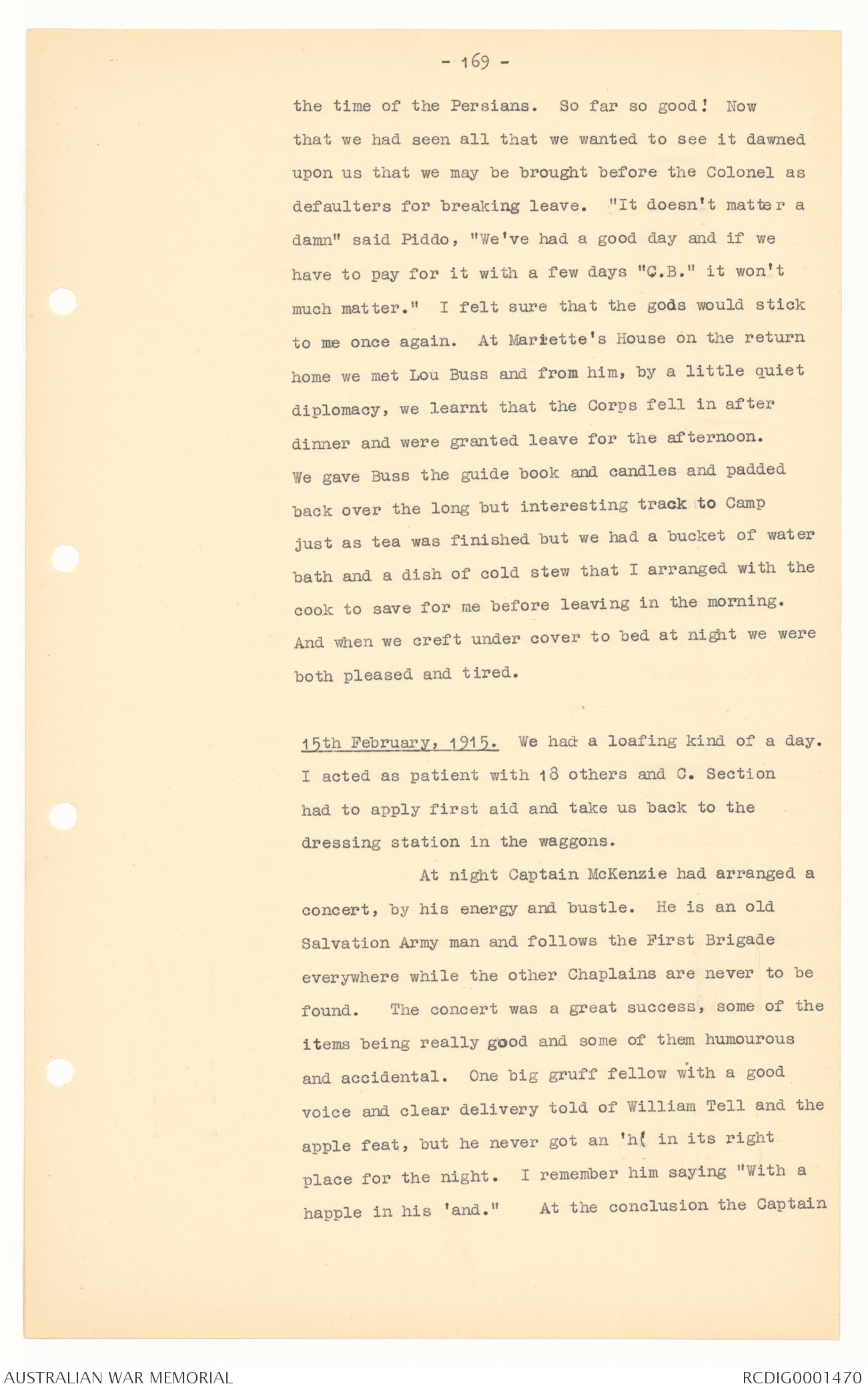
-160-
stops at the physical suffering to yourself but it
is carried in the system and transmitted to and breaks
down the health of the innocent wife, also brands the
offsprings with ulcerated sores that mark the disgrace
of the parents at the first weakness or illness that
comes their way. A man that has been wayward enough
to contract a dose should never be permitted to marry!
Fancy a woman giving a clean and wholesome body to
a wrecked and turbulent, diseased body of a soulless
man, The horror of it! "Oh, if you men would only
look ahead and think of the bright young sweethearts
left behind and the lifelong corruption likely to be
brought to blight their trusting lives by your visits
to the terrible dens of sin and sorrow so plentiful
in this country. A dose is thought lightly of by some
of our men but if they only knew its possible consequences
they would hide their heads in shame from
their comrades and tremble with knowledge that the
body given them by a good mother and father has been
wasted and thrown to the winds all for a moment of
doubtful excitement through want of strength and will
power. A man who violates the laws of chastity in
these dens of infamy should have a harlot for his
wife." It was a lecture that carried tremendous
weight and has given the fellows something to think
about and will no doubt do them the world of good.
Why this lecture did not take place eight weeks ago
before there were so many young and inexperienced
fellows dosed with dread venereal troubles, more or
less seriously, is difficult to understand. I think
Headquarters have given our Chaplains a bit of a
shake up, as they are seldom seen on the camp and
just rush carelessly through their services. Anyhow
it's better late than never; giving in that the men
-161-
have mostly taken a tumble to themselves, and
instead of lining up at the brothels in crowds they
are in twos and threes.
9th February, 1915. I had a chat with Captain Wessal
about football being of such great benefit to the men,
which he agreed to, but he and the other officers
have not attempted to assist in either arranging
games or obtaining leave for the players, so unless
they move and take some interest I will let it drop,
as I have no inclination to play. I don't get much
fun out of it and run a greater risk of being knocked
about as they leave such a lot of work for me to do.
Football with me is a thing of the past absolutely.
I know that I can't work beside without
getting knocked about and I have been knocked about
sufficiently during my sixteen years of play, though
fortunately never seriously. I have also had my
fun and glory out of the game.
I am on guard to-day and had a pleasant time
watching the ever-changing light that breaks through
the clouds and shows up the bright patches of the
desert in the far distance.
At a lecture in the Y.M.C.A. rooms last night
Judge Amos gave a good chat on Egypt which the fellows
are pleased with. I was on guard. He said that the
cream of Egypt were the Turks and intermingled
descendants, while the Arabs are higher than the
Egyptians. The married laws are remarkable. A man
can divorce his wife simply by telling her to walk
out and go away. She goes to her father and the dowry
is returned. If he wants her again he goes to the
father and gets her back. If the wife is unusually
strong and independent she secretly takes away the
-162-
jewellery in which most of their money is invested
and then run away themselves. Only in isolated
countries do they look upon more than two wives with
other than disgust. Both Egyptians and Arabs are
absolutely chaste in married life. Many murders are
committed and nearly all are brought about through
lack of chastity. The girl's father always asserts
great influence over her even after marriage and
mostly favours the man, making the girl bow to his
wish and rule. Fathers kill their own daughters without
compunction if they are in any way immoral.
10th February, 1915. I did not go on early parade
this morning and went on sick parade at 8 a.m. with
my scabby knee which has been festering a bit. I was
ordered light duty so I went away to the Y.M.C.A.
room and with a weak sunlight printed off a large
number of Capt. Welch's films which I borrowed, unknown
to him. I did the same in the afternoon
besides collecting my pay and stayed on toning and
fixing up to 8 o'clock, and now I find to my regret
that I do not print them quite dark enough so the
40 or 50 of them are a very poor lot indeed.
Pay day has not come before its time.
There's not a fellow in camp that seems to have a
piastre. Borrowing is rampant - money as well as
matches, cigarettes and tobacco. Half the fellows
stayed at home on their leave day as they could not
go into town. For my own part, the photographer
brought my postcards on which I owed 1/-, and when
he brought them Bob Miller had to pay the 1/- for me.
This is the first time I remember being absolutely
broke.
-163-
I got two Xmas cards from California yesterday.
Philip Rees, John and the Scales family. Win also
wrote a nice kindly letter. By jove, it's up to me
to marry this girl if the fortunes of living favour at all.
11th February, 1915.
It is now 10.30 p.m. I have
just arrived back to camp from a real good day's
entertainment with Jack Pidcock. We left the tram
just past the Zoo and went across the Kars de Nile
bridge into the Ghezireh Gardens which are splendidly
kept. It was a glorious morning - just the golden
sunlight that made one long to roll and loiter on the
nice grass. We passed along the river where a number
of luxurious passenger steamers are lying idle,
there being no tourist traffic this year at all.
At the next little but beautiful garden we played
football with the two small boys while the nurse maids
held conversation and gave cheek. We passed the well-fitted
up Gezira Sporting Club with its racecourse,
golf links, bowling green and innumerable tennis
courts. The big bridge was open to allow the sailing
boats to pass up and down the Nile when we got there.
I took two photographs and caught the tram for Cairo
and on to Heliopolis, where I found it the same dream
town or fairy-like town as on my last visit. I went
into the magnificent hall of the Palace Hotel, now
used as a hospital, and through the immense black
and white marble columns supporting the dome - very
fine. Back by the slow round-about way to Cairo
and arrived after much interest at the Muski at
4 o'clock. I got some films and a bright smile from
the register girl. The National Bank of Egypt would
not give me any blank cheque forms so we went to the
Anglo-Egyptian Bank and got them there. We saw some
-164-
lovely photographs and longed for a few pounds and
the surety that we would return to Australia again.
We went into a large store to look around and had a
pleasant half hour with the men and anxious girls who
mostly spoke a little English. Dinner at the St.
James - 18 piastres. It was very good indeed. I
enjoyed it immensely, more so as we only had a bun
and a cup of cocoa since breakfast.
I struck an intelligent group of college
boys with the red caps on and I was surprised at their
quest for information and the nice questions they asked.
Pidock assured me that it was the best
day he'd yet had in Cairo.
12th February, 1915. The whole of the 1st Brigade
(4,000 men roughly) with the A.M.C. and the Army
Service left Mena Camp for a three or four day camp
on the edge of the Zibyan Desert - some 6 miles south
of the Pyramids but by the road we took withs its
windings and turnings it must have been 11 miles
distant. The camp is situated on a lovely patch
of green reeds that are like grass for 500 yards
or so. It is the most pleasant natural sight I have
yet seen near Cairo. It would be a lovely spot
for a cricket or football ground. I took off my
boots and ran around like a youngster when we first
arrived into our new camp and had the tents pitched.
I went for a walk towards Abusir Pyramid after dark
with Pidcock, and unexpectedly found ourselves tramping
across field of young barley. At one mile or
so it seemed so dark that it would be quite useless
to continue so we turned back and went to bed under
the sheets spread over the Ambulance waggons to keep
the dew off, at about 8 o'clock.
-165-
The march out along the winding valley road
was very interesting although I was on the Canal side
and had the views on the more open side cut off, also
had a poor position for the scenery.
13th February, 1915. Mabel Williams wrote a nice
welcome letter telling that Bro. Tom had married and
was living in Cardiff. I will have to write him.
She also mentioned that Malcolm McArthur had joined the
Black Watch and gone to the front.
Yesterday was intensely hot and those poor
infantry fellows were out manoeuvring from 4 a.m.
until 2.30 p.m. on the sand-dunes. On their return
to camp there were in the very best of spirits and even
had foot races, leap frog and other games bare-footed
on the green and soft ground. After dark the Pipers
played off a few tunes, then the fellows kept a very
enthusiastic concert running.
Water is obtainable from one small hand pump
only, and the men had to wait two deep back for 100
yards to-day in line.
All of our officers are just as discontented
and anxious to get into action as we men are. They
growl and snap at one another just as we fellows often
do.
I slept under an ambulance waggon last night
with Pidcock.
14th February, 1915. Four of us slept together under a
few stretchers covered with a waggon sheet spread over
the top to keep the heavy dew off. I lay like a
blooming mummy all night as there was no room to
double one's self up or even to turn over. This is
very necessary when the ground is so hard and one's
side gets stiff and even sore.
-166-
The flowers on the Desert edge are fairly
bright and have some little perfume, yet the variety
is small. I have never seen anything so surprising
and handsome as the flowers on the semi-desert
country of Western Australia. They have no perfume
but they grow on all kinds of bushes, trees and grounds
and in wonderful variety and plenty,
After filling two water carts I could see it
was going to be a quiet kind of day with us, more so
as the infantry who had come in at 9 o'clock were not
going out again until 12 o'clock at night, so I
influenced Pidcock to come away without asking for
leave with a possibility of being refused, over to the
Pyramids of Abusir and then on to Sakkara - a distance
of about 5 miles.
At Aubsir there are three Pyramids in a very
decayed state, but they are remains of most remarkable
work, not so much the construction of the Pyramids
as the astounding temples on the East side of each
of them - just broken portions of columns and fragments
of wall decorations, pavements and fine granite reliefs.
These are scattered about and shattered but quite
enough to enable the visitors to judge just what the
height and elegance of the temple was.
The excavation of these massive buildings
are carried out be a German and much of interest gone
to Berlin between the years 1903-1907.
The largest Pyramid was built by King Suhura
of the Vth Dynasty (about B.C. 2750) and with its
temple is even now an impressive sight. Both Suhura
and Urerenna have long causeways leading from the
Pyramid down to the desert edge along which the
huge stones were brought while the Nile was in high
flood. Portions of the columns must have been 4 f t.
in diameter and 18 ft. in length.
-167-
At the third Pyramid is a poorly built temple
of bricks said to have been completed by the King's
Son after the father's death.
Amongst a heap of red earthenware pots and small
wine glass shaped utensils we noticed a piece of
cloth which was soon discovered to be a mummy or
parts of one. Anyhow we unearthed the skull and
spine, parts of which (including teeth and hair) I
put into my pocket. There were some pieces of stone
carvings that I would have liked to send back home,
that is it I only knew when we would be like to be
going back. We walked over fully 2 1/2 miles of desert
to Sakkara and found interest every yard of the
journey in the peculiar colours and shapes of the
stones and the number of bones; while the wind-swept
sand-dunes with ravines worked through the softer and
stoneless materials as though the rain had cut them
during a thunder storm, but it only rains 1 to 2
inches per year around Cairo.
Pidcock like myself was very much taken back
to find that the desert is not one long sandy waste
of flat country but a series of hills and hillocks
of all sizes and varieties and even fascinating shapes,
covered with stones and petrified wood and bones.
The first tomb we came to was that of Ti
and it is considered the finest example of Egyptian
art that has been handed down. One room out of some
five alone has its original roof. Every portion of the
wall, above 4 ft. from the floor, is pictured with
very interesting and well executed stone carvings.
The fact that this, and other works of ancient art,
are so splendidly preserved is due to their having
been covered over with sand for a thousand or more
years. Ti was not a king but a very wealthy man of
-168-
great influence. A theory that ropes were used to
build all of the Pyramids, instead of the popular
belief that sand was backed up against it and the
stones rolled up the and into place, is much forced
upon me now by the wall carvings showing a huge king's
shrine being drawn along by a whole crowd of men with
long ropes and men pouring water on the rollers or
skids to prevent friction. In fact rope with the same
appearance as present day ropes were commonly used
judging from the many times they are shown on these
wall carvings.
We went 200 yards to Mariette's House
where we expected to get fruit and a large cup of
tea but all they had was coffee, egg-cup
size, at 1 piastre. We cut it out and bought some
tomatoes and Arab maize meal bread from a dirty-looking
curse of a nigger, and sat down to a very
passable lunch. We took some bread and jam from the
camp but these had long since been devoured.
On arriving at the Street of Tombs the
map showed that the Pyramid of Onnos was on the other
side of the Step Pyramid and as we missed this old
relic on our camel journey through Sakkara we pulled
ourselves together and made off. The day was very
hot and the walking heavy. This pyramid was opened
in 1881. The tomb chamber and ante room are of the
earliest and rather roughly-cut hieroglyphics referring
to mythology and are known as the oldest Egyptian
Pyramid texts. The tomb chambers are lofty and
covered with the well know star design. The vertical
shaft of 72 feet has an iron spiral staircase leading
down. This after the burial was filled up again.
For some 100 yards around here there are many later
forms of burial in big square shafts attributed to
-169-
the time of the Persians. So far so good! Now
that we had seen all that we wanted to see it dawned
upon us that we may be brought before the Colonel as
defaulters for breaking leave. "It doesn't matter a
damn" said Piddo, "We've had a good day and if we
have to pay for it with a few days "C.B." it won't
much matter." I felt sure that the gods would stick
to me once again. At Mariette's House on the return
home we met Lou Buss and from him, by a little quiet
diplomacy, we learnt that the Corps fell in after
dinner and were granted leave for the afternoon.
We gave Buss the guide book and candles and padded
back over the long but interesting track to Camp
just as tea was finished but we had a bucket of water
bath and a dish of cold stew that I arranged with the
cook to save for me before leaving in the morning.
And when we creft under cover to bed at night we were
both pleased and tired.
15th February, 1915. We had a loafing kind of a day.
I acted as patient with 18 others and C. Section
had to apply first aid and take us back to the
dressing station in the waggons.
At night Captain McKenzie had arranged a
concert, by his energy and bustle. He is an old
Salvation Army man and follows the First Brigade
everywhere while the other Chaplains are never to be
found. The concert was a great success, some of the
items being really good and some of them humourous
and accidental. One big gruff fellow with a good
voice and clear delivery told of William Tell and the
apple feat, but he never got an 'h' in its right
place for the night. I remember him saying "With a
happle in his 'and." At the conclusion the Captain
 Sam scott
Sam scottThis transcription item is now locked to you for editing. To release the lock either Save your changes or Cancel.
This lock will be automatically released after 60 minutes of inactivity.